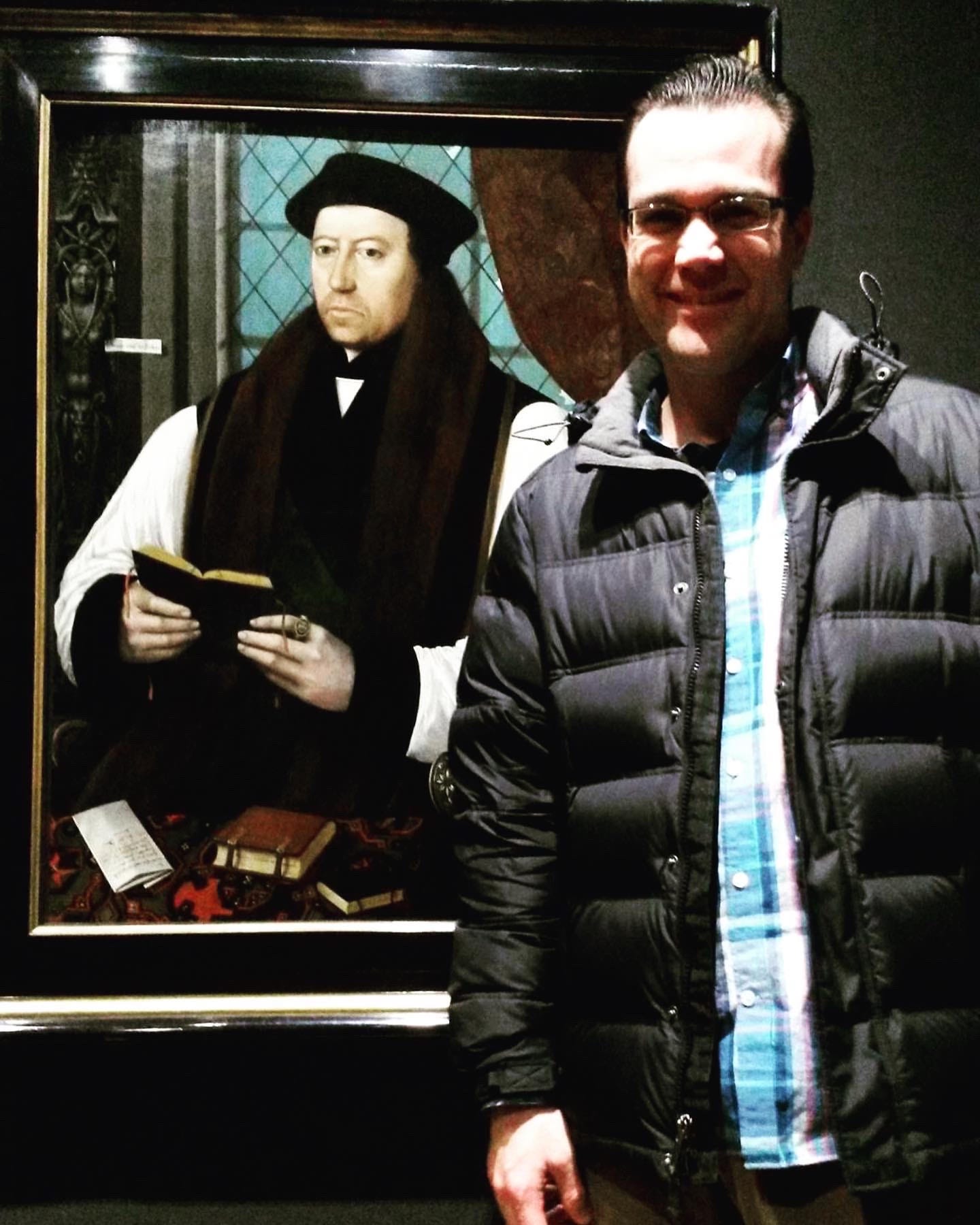There are moments in your life when you are alone with two cups, and you have to pick one to drink. There are moments when the decision will change everything.
-Everything Sad Is Untrue
Hit by a storm
I have been at Midwestern Baptist Theological Seminary for eight years now. More than that, I have given twenty years of my life to Southern Baptists—2025 marks two decades. It’s hard to believe it’s been that long. For two decades my family has sacrificed a lot for the SBC.
But we can do so no longer.
I cannot begin to express how happy we are with that decision.
So, what happened? We were hit by a storm, a tornado really. We had no idea the tornado was coming and for the longest time we told ourselves it cannot be. But in much suffering, we have discovered that the Lord himself sent this tornado. In fact, we’ve learned since that the Lord himself was in this tornado, knocking down one pillar of our SBC house at a time.
The first pillar started to crack a year ago when a group of Southern Baptists stood before the SBC asking for the inclusion of the Nicene Creed in the Baptist Faith and Message. I applaud these men. But the responses said everything, from “No creed but the Bible” to “It’s not good timing” to every other excuse in the book. When the resolution was presented before the Executive Committee months later, the committee officially rejected the creed’s inclusion. Regardless the reason, I cannot stay in a denomination where the Nicene Creed has been officially rejected from inclusion and remains blatantly absent.
I will, of course, pray that the SBC changes its mind. But I’ve come to realize that even if it is included the polity of the denomination is not such that it can implement the creed with authority like other traditions can, traditions that believe in councils and synods and have the polity to credibly support them. But more to the point, the culture of the SBC is not one that can ultimately sustain those who care about retrieval and the Great Tradition. Here we are in 2025 and EFS (eternal functional subordination of the Son) is still taught at Southern Baptist seminaries. At some point, we have to stand for something. Otherwise, we are complicit in our complacency.
The second pillar that started to crack was polity, but more specifically the culture in which it is embedded. My experience after two decades both at the local level and institutional level is this: for Southern Baptists image is everything. There is nothing and no one they will not sacrifice on the altar of their image. But it’s not just a commitment; it’s embedded in the culture itself. When image is everything, a culture of fear follows, so that anyone who does not match up with that image is considered a threat. As we’ve seen in the last couple of years, the SBC has been plagued with covering up sin to protect its image. But this occurs at the local church level as well. When there is sin in the leadership, the impulse is to cover it up to protect the image rather than being transparent with the church. Southern Baptist pastors often tell their congregations, “Just trust us,” and “Don’t gossip,” which results in a church incapable of acting when they suspect sin in the leadership. Moreover, they have little recourse to an external ecclesiastical authority to hold the leadership accountable.
But as I returned to the scriptures, I could not escape a very different, and far healthier model, one designed to keep leadership and laypeople alike accountable. After reading the book of Acts with fresh eyes, especially the Jerusalem council in Acts 15, it was conspicuous to me that most other traditions are far more consistent with the whole of Acts. Presbyterians have a presbytery and synods, and Anglicans prosper on a rich heritage of bishops and councils. After the apostolic age, episcopacy becomes the majority report in the pre-modern church for good reason.[i] I can no longer go along with Southern Baptists who pride themselves on a type of independence that locks out effective external accountability. Nor can I continue ignoring the spiritual abuse that so many have suffered as a consequence. In short, when image is everything, the cross is eclipsed. Ironically, this does not image the humility of Christ.
God took a sledgehammer to the third pillar: baptism. When forced to account for the whole of ecclesiology in the book of Acts, I simultaneously could not escape the apostle Peter’s stalwart promise at Pentecost. At the end of an evangelistic message, Peter calls on the crowd to repent and be baptized for the forgiveness of sins and to receive the Spirit. But that’s not all. Peter adds, “For the promise is for you and for your children” (Acts 2:39). I think Peter was smart enough to know what he was doing. He knew he was echoing God’s covenant promise to Abraham, a promise that is not individualistic but corporate, not free will based but familial. Knowing the continuity of the covenant promise, Peter was not about to leave the children of believers homeless.
I don’t need to rehearse arguments for infant baptism here (see J.V. Fesko and Guy Waters). But the scales fell off my eyes when I saw for the first time that the Baptist hermeneutic is truly individualistic—it’s modern to the bone. After noticing it could not account for the whole canon, I also had to ask myself, “Was the entire church wrong to baptize the children of believers for a millennium and a half? Was believer’s baptism taught by the apostles only to disappear under the supervision of the greatest theologians of the church, and then reappear for the first time in sixteenth century?” For someone serious about catholicity, that pill was too big to swallow. Of course, others told me, “You just have to trust the progressive covenantal argument.” Besides its inability to provide wholistic answers, it’s self-conscious departure from reformed confessionalism, especially around the covenant of grace, proved insufferable. As if Southern Baptists today do not have enough of a proclivity against creeds and confessions.
The Beauty of Anglicanism
Some will assume I am becoming Anglican because I don’t want to be Southern Baptist. But that’s only half the story. In the rage of the storm the Lord took me to a quiet nook deep in the cleft of a rock where clarity waited along with the peace of God. There I met Anglicanism as if for the first time. There I found the church. And she was beautiful indeed.
As you can tell, our family is burnt out on the Southern Baptist mindset—the big show. My family has been crying out for participation, not mere performance. And then we walked into St. Aidan’s Anglican Church in Kansas City. It ruined us in the best way.
The Book of Common Prayer is meant to be experienced, not described. But I will mention a few key turning points. At 10:00am the people at St. Aidan’s turn in unison to the back of the church where the processional with the cross begins, a picture of Christ going before his bride. The clergy do not wear clothes that tell us about their personalities, but vestments that convey the gospel. Rector Michael Flowers (now a good friend) begins with a congregational collect for purity as we approach a holy God. Then comes a flood of scripture. A psalm is chanted, and the congregation chants it back. The church shouts “Alleluia!” as the deacon proceeds into the middle of the church with the Holy Gospel signifying Christ’s descent into the middle of his people. As for the homily, it is a deep spiritual exercise in contemplation (think more Mary than Martha).
After collective Prayers for the People, the church stands to confess the Nicene Creed, only to drop to their knees for the Confession and Absolution.[ii] After pronouncing the Peace on one another, the Doxology begins and the whole church sings The Sursum Corda, a liturgy from the third century. Michael then chants—yes,chants—the liturgy (“It is right, our duty and our joy, always and everywhere to give thanks to you…”), to which the church responds by singing that patristic hymn, The Sanctus.[iii] Next, from memory (!) Michael chants the Prayer of Consecration only for the church to respond by proclaiming the “mystery of the faith,” the Lord’s Prayer, and the Prayer of Humble Access. The people are never warned about Christ’s real absence but instead the BCP petitions God to sanctify bread and wine, as well as the people to receive it. “Receive” is the optimal word. For when the people come forward, they do not take but receive the bread and wine from the rector himself (his presence providing accountability and counsel). For as Luther said, we are beggars. Last, the people respond with that seventh century prayer, The Agnus Dei. I could go on, but the liturgy we experienced (BCP) is a movement of ascent. Christ descends into the midst of his people, his presence made real by word and sacrament, so that we can ascend by the grace of his Spirit to participate in the benevolence of the Father. This sacramental theology stands in stark contrast to the disenchanted mindset of our modern world, which is why so many are drawn to St. Aidan’s.
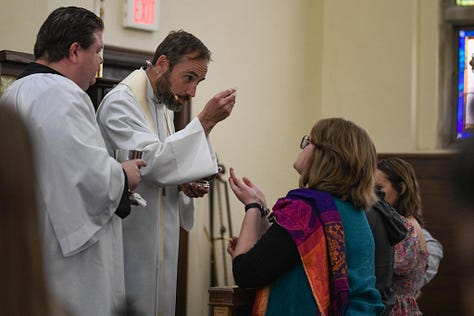
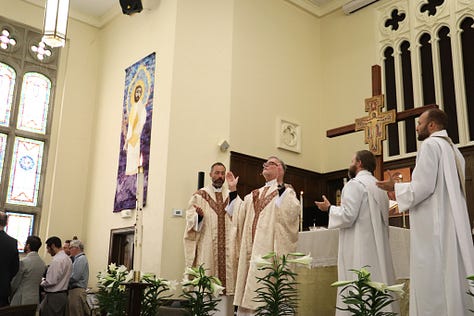
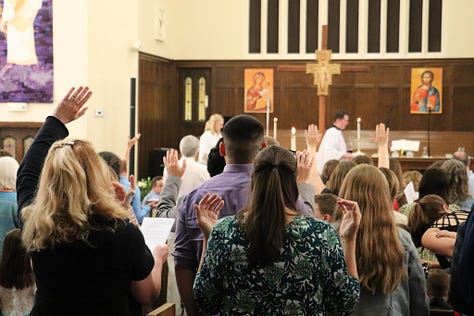
And these are just the basics. I have not even described morning prayer, the church calendar’s consecration of time, a patristic homily on Good Friday, the three-hour tour through scripture for the Easter vigil, or Easter which is not one Sunday but a whole season of Eastertide. I have never encountered so much scripture than when I’m in an Anglican church and such love for the Great Tradition at the same time.
What a comfort to tell our kids, “The way we are worshipping is how Christians have worshipped across history. It’s really, really old. You are participating in the church universal.” Our kids were surprised to learn that Anglicanism is not only ancient but the largest Protestant tradition in the world today. It is a global communion. John Webster was right: “episcopal order is indicative of the ‘self-organizing’ power of the gospel.”[iv]
So, what’s next?
We are leaving the SBC, and our family is becoming Anglican.
Trinity Anglican Seminary
I have officially joined the faculty of Trinity Anglican Seminary. What a privilege to be elected Research Professor of Theology. My first course, “The Reformation as Renewal,” will begin in January.
Trinity is led by President Bryan Hollon. One thing I respect about Bryan is that he is a president who cares about classical theology (read his vision for Trinity). He is a theologian himself, one who has written on Henri de Lubac.
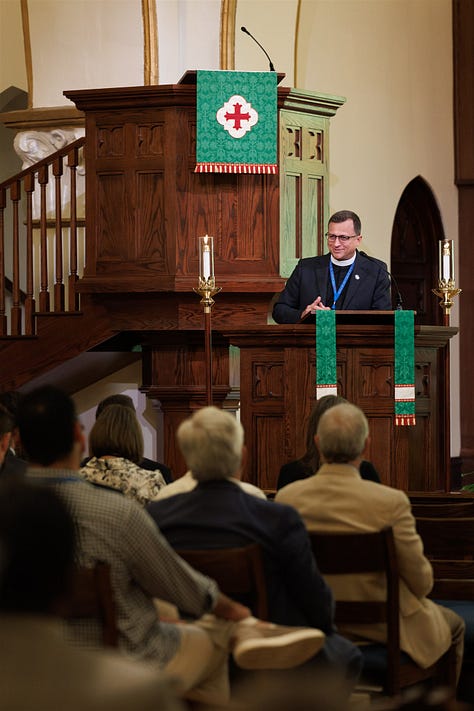
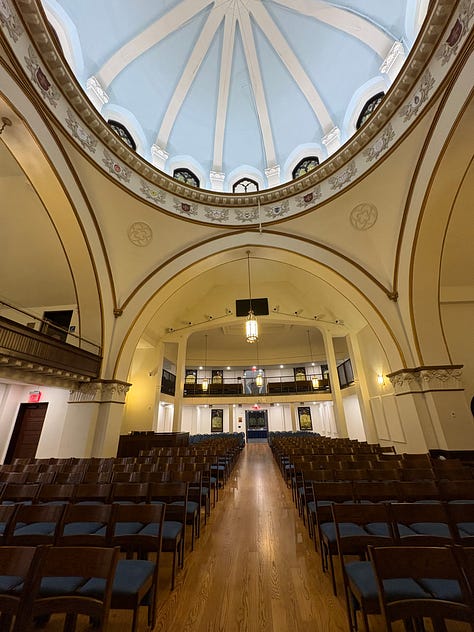
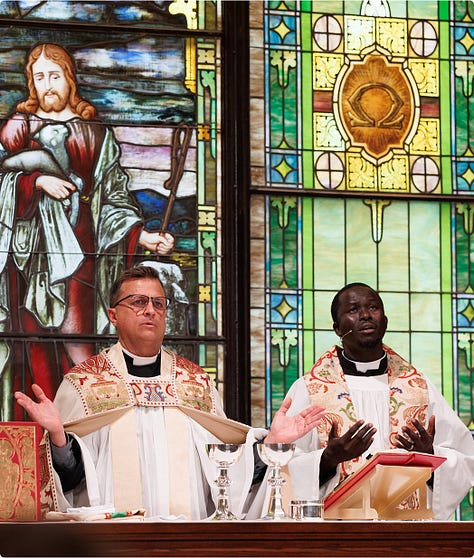
Trinity is committed to being “classically Anglican,” as they like to say. The seminary is unapologetically “catholic and reformed.” Students are taught the Reformation, but in a way that “reclaims” the one, holy, catholic, and apostolic church. Naturally, they take patristic and medieval theology seriously. Consistent with being classically Anglican, students are trained in liturgics, virtue, aesthetics, and of course Anglican history and doctrine. Trinity is right to claim, “non-Anglican seminaries cannot match the Anglican immersion offered by Trinity’s community life and curriculum.” Students begin and end each day on campus with morning and evening prayer and once a week the entire community comes together for Holy Eucharist.
Moreover, Trinity has some notable scholars. I’ve used their books in the past with students. David Luy is the author of Dominus Mortis: Martin Luther on the Incorruptibility of God in Christ (Fortress) and Evil and Creation with Matthew Levering (Lexham), Joel Scandrett is the coauthor of Mapping Atonement (Baker Academic), and Don Collett is the author of Figural Reading and the Old Testament (Baker Academic) and a Commentary on Hosea in Swain and Allen’s International Theological Commentary series (T&T Clark). They’ve also just appointed Alex Fogleman, author of the new book on catechesis called Making Disciples (Eerdmans), as associate dean and assistant professor of theology. And many others.
Kansas City, here we stay!
Trinity has been generous, inviting me to travel to its campus throughout the year to teach my courses so that our family can continue living in Kansas City. Moreover, they will partner with St. Aidan’s to start a church-based program, so that each year one of my courses is taught here in Kansas City.
My story is ironic. I was a Baptist when I was a lecturer at Oak Hill College in London, England, the same school where J.I. Packer cut his teeth. But in God’s mysterious providence it is here in the heartland of BBQ and Chiefs territory that the beauty of Anglicanism finally pierced my heart.
Our family will be confirmed at St. Aidan’s where we plan to stay. If you are in Kansas City, come join me. You do not have to be Anglican to come. Most of the people at St. Aidan’s did not start out as Anglicans anyway. Plus, Anglicanism is at its best when it is as kind as Jesus was meek. As my cousin from Los Angeles kept saying to me, “The Anglican Church welcomes you, Matthew.” Welcomes you.
Moving forward, I have much peace now that I’m out of the SBC. I experienced an angry fundamentalism in the SBC, one based out of a deep-seated fear. Believing in classical theology and publishing in classical theology brought on no little harassment. I finally realized it was not possible to do true academic work in classical theology within the SBC without fear of constant inquisition. I kept telling myself otherwise, but at last I came to see the obvious: I care most about what is being taught; they care most about who is doing the teaching. The latter is toxic for scholarship when coupled with that second-degree separation mentality. It violates the academic’s duty to engage people of different ideas. When you have to separate from everyone who does not first become “like us,” you might as well dig a grave for the intellectual life.
My pilgrimage into classical theology has led me to conclude that Anglicanism is the most beautiful representation of classical Christianity. Undoubtedly, there’s a reason it takes a C.S. Lewis to write Mere Christianity. But the great thing about this pilgrimage is that I am not alone. The living portraits of countless saints line this trail, from St. Aidan to Anselm, from Thomas Cranmer to John Jewel, from Richard Hooker to George Herbert, from John Stott to E. L. Mascall, from reformed theologian J.I. Packer to the late John Webster. I am not naïve. I know that the ACNA has its fair share of challenges. But I am ready to humbly serve wherever I can be of use.
As for my Baptist students, you have been a blessing to me, and I pray I have been the same to you. Do know, this is not the end but only the beginning. I pray my writing continues to serve you as you retrieve orthodoxy. I hope my future ministry embodies the warm spirit of C.S. Lewis towards those of you who do care most of all about the renewal of orthodoxy today.
As for Anglicans out there, thank you for being so kind to me and my family. I look forward to learning from you and serving alongside of you.
Gratitude
One of God’s bulwarks during this tornado was the counsel of old and new friends. Regardless of whether they agree with my final decision, I am thankful to all of them. I am thankful for Bishop Julian Dobbs. I had the privilege of speaking at his conference, and the unity of so many in his Diocese for the Living Word around the 39 Articles gives me great hope for the future. I am also truly grateful for the providential friendship of Randy Caldejon whose passion for retrieving classical Anglicanism is contagious.
I should also thank my friend Lee Gatiss, whom I first met in London. When I confided in him, he provided me with resources and kept checking in on me. But no one understood my situation so well as Craig Carter, a faithful friend. I am indebted to many others who provided counsel and prayer, including J.V. Fesko, Scott Swain, Timothy George, Robert Yarbrough, Michael Reeves, Michael Bird, Carl Trueman, canon theologian John Clark, Tory Baucum, and my enduring friends, Joshua Hedger and Ben Klar.
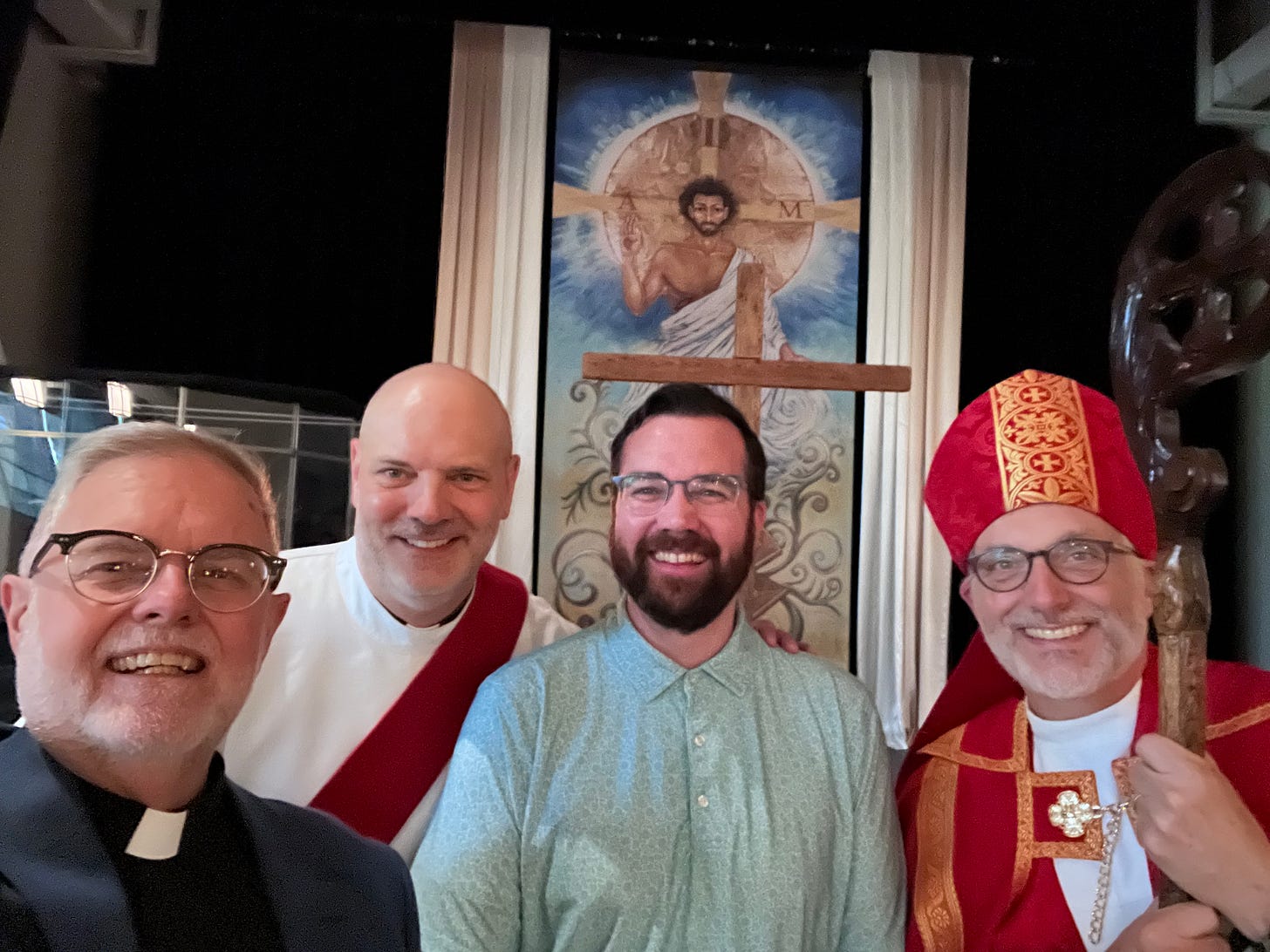
I am also grateful to Bishop Stewart Ruch who dedicated himself to prayer. The Lord used his timely encouragement to push me forward. But above all, Michael Flowers has been patient, persistently empathizing as one who has known our pain. A true friend in the fire. Thank you, Michael, for showing us that Jesus is gentle and lowly in heart. Thank you, all of you, for caring for me and my family.
What shall I say in the end? God is my light. Deus Lux Mea Est.
[i] I had to ask myself, Why did the church fathers believe the New Testament naturally gave birth to bishops (of which we have elaborate records)? Are we consistent to cherry-pick, stealing away the doctrine of the creeds while rejecting the polity of the councils and the office of bishop so instrumental to implementing doctrinal accountability in the church?
[ii] The Nicene Creed is affirmed in the Thirty-Nine Articles, along with the Athanasian creed and the Apostles’ creed.
[iii] Based on Isaiah 6:3, Revelation 4, and Matthew 21:9.
[iv] Webster is paraphrasing P.T. Forsyth’s Lectures on the Church and the Sacraments.




